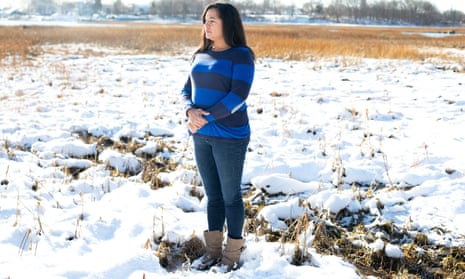I started an apprenticeship on NBC Nightly News in July 2001. At that time, the programme was hosted by Tom Brokaw, a veteran newscaster and household name in the US. I was 23 and had grown up watching him with my family. I was a desk assistant, answering phones, opening the mail, logging tapes, whatever needed doing. I was in the newsroom on 9/11; as the second tower was hit, we all watched it happen live. The days after were emotional and exhausting, but our job was to report the news.
About a week later, I was opening the mail when I came across a letter that looked as if it had been written by a child. Tom received a lot of mail: love letters, hate mail, gifts, faecal matter. A colleague and I would open it and give it to his assistant, Erin, who would write back on his behalf. This one immediately felt creepy.
Inside was a note on a tiny piece of paper and a substance that looked like brown sugar and sand. The note had scribbly handwriting that said, “09-11-01” and in capital letters, “This is next, Take Penacilin [sic] now, Death to America, Death to Israel, Allah is great.”
I showed it to people around me and asked, “What is this?” I put the substance in the bin and left the envelope and note on the mail pile in Erin’s office. That night I went to my boyfriend’s apartment.
Ten days later, I woke up and my glands were so swollen that my chin disappeared. I had a high fever and a sensation of something running through my veins. I’d recently started acne medication and thought maybe it was an allergic reaction. My doctor gave me antibiotics, and three days later I returned to work.
Then, on 5 October, it was reported that Robert Stevens, a photojournalist at another media company, had died from inhalational anthrax. There were news reports about him having opened a love letter addressed to Jennifer Lopez. Around the same time, Erin had gone off sick, too. People at work talked about us both being off with bizarre symptoms, but it didn’t click that it might be related to the letter. Unbeknown to me, Tom and Erin were tested for exposure to anthrax; it came back positive but they didn’t know how she’d been exposed to it.
A couple of days later, I got a call saying I needed to come to the office asap. The urgency freaked me out and when I got in, I was told a black car was waiting to take me to be questioned by the FBI.
The FBI interrogated me about everywhere I’d been. They thought I could have had exposure to anthrax naturally (where it isn’t usually harmful in low doses). It wasn’t until towards the end of the conversation that I told them about the letter. It might seem obvious now that it was the source, but man-made weaponised anthrax wasn’t something we knew about then. I was questioned for seven hours; I wasn’t allowed to call my parents, who were watching TV reports about anthrax at NBC and couldn’t get a hold of me.
Eventually I spoke to them, and my dad drove down to New York. We were put into hiding in a hotel for a week. I must have had 50 vials of blood taken. I wanted to help, but felt like a vessel they were using to extract information from – and that added to my trauma and fear. I was given antibiotics for 100 days and was worrying about another terrorist attack. I couldn’t sleep and became paranoid.
For weeks, people in hazmat suits tested and vacuumed the NBC building and ventilation systems. My mum got me to ask them to get my house scrubbed, too. Spores were found in my apartment – and my boyfriend’s. Our belongings were destroyed for our safety. A week after being questioned by the FBI, I returned to work. I forced myself to open the mail. That simple task became so emotional, but I knew it would help me.
Five people died from anthrax poisoning in that period. I became close friends with another survivor during the FBI investigation. When the main suspect committed suicide in 2008, it was incredibly disheartening. I wish I could sit in a courtroom and look someone in the eye and say, “You did this.” I don’t feel closure over it today. I’m not sure any of us ever will.
As told to Candice Pires
Do you have an experience to share? Email experience@theguardian.com

Comments (…)
Sign in or create your Guardian account to join the discussion